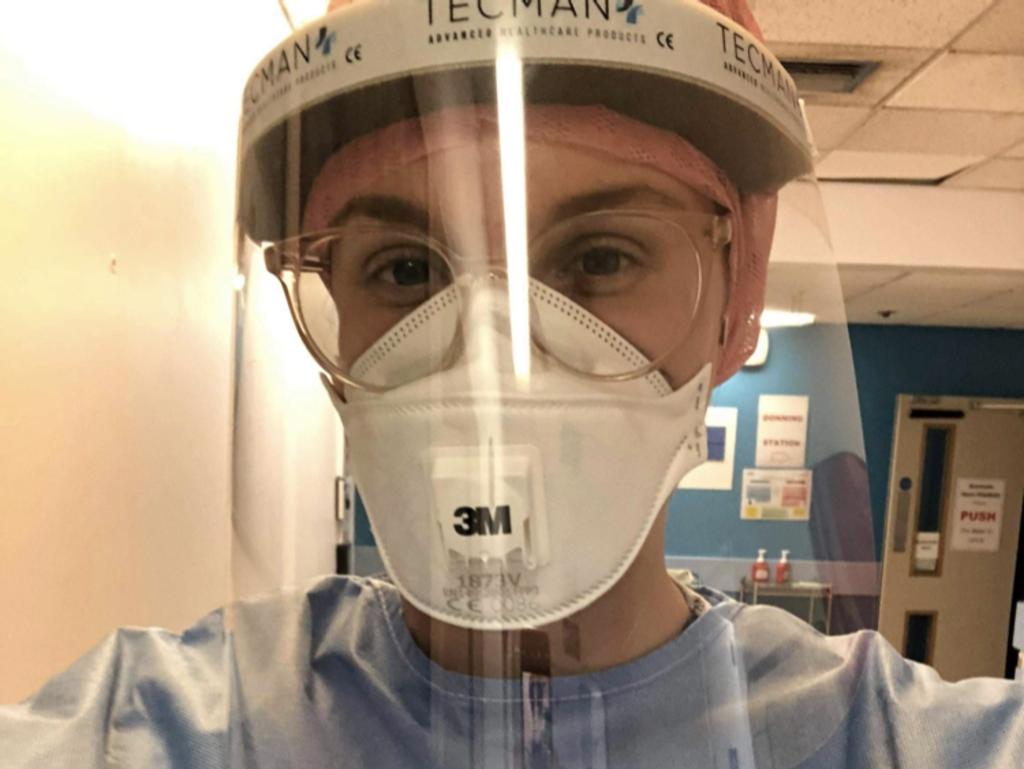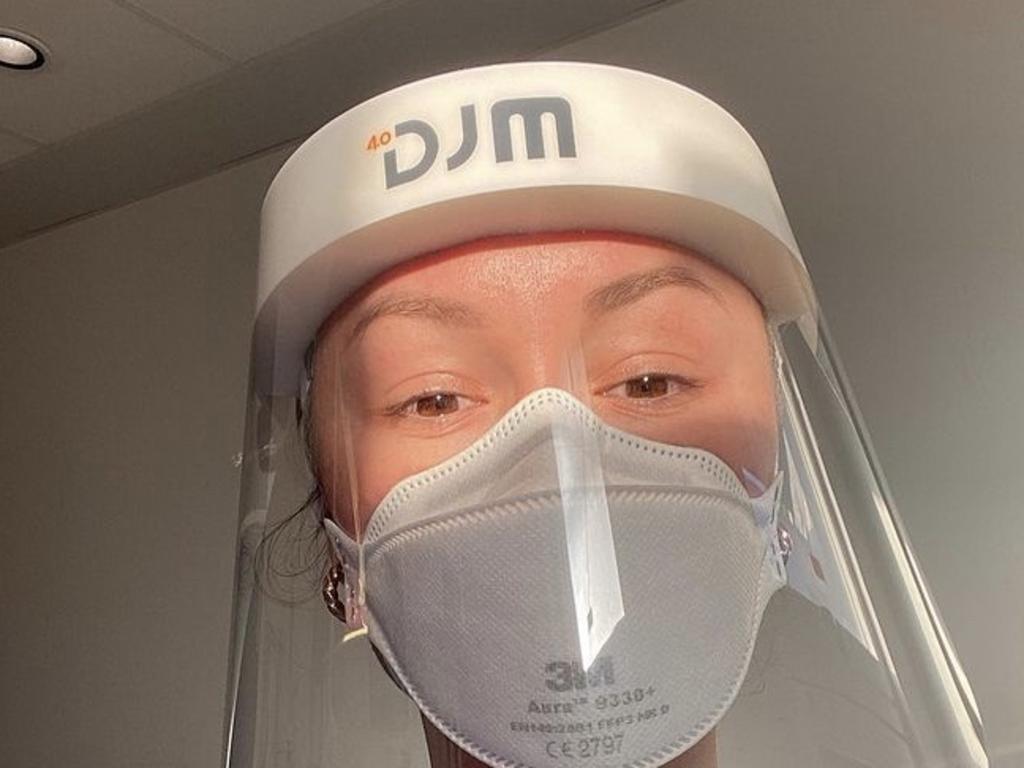COVID vaccine: ‘Why would Australia push pause button?’
Aussies who have received the coronavirus vaccine in Britain say the jabs need to be given the green light without delay.
Australian health workers who have received a coronavirus vaccine in Britain say the jabs should be rolled out the “sooner the better” at home.
Intensive care unit nurse Melissa Purcell, of Sydney, lab technician Hannah Brophy, of Brisbane, Cairns ICU nurse Kathryn Lennon, and Sydney dietitian, Jasmine, were among the 1 million people in Britain who have been inoculated in the first month of the program.
The Pfizer/BioNTech vaccine was approved on December 2, and the Oxford/AstraZeneca vaccine was given the green light last week as daily cases hit 50,000.

Britain’s health regulators worked fast to approve the drug, analysing data throughout trials rather than waiting to review it at the end.
Melissa Purcell, 29, works on an ECMO ward, where machines temporarily replace patients heart and lungs operations to allow them time to recover.
The Sydney nurse had a dose of the Pfizer vaccine, which must be stored at temperatures of minus 70 degrees on December 28.
She said that she had a “dead arm” because it was “super cold”.
“I have had a few friends that have had it but no-one had side effects,” she said.
Ms Purcell said that the vaccine was “safe” and that Australia should begin vaccinations.
“The sooner, the better,” she said.
“People have vaccinations, like girls have the HPV vaccine (for cervical cancer), and they don’t really think about it. I believe it (the coronavirus vaccine) is safe.”

Ms Purcell, who got the virus in April, works with seriously ill patients at the Royal Brompton Hospital in London.
On one of her most recent shifts there were 15 people waiting on the life saving machines in her ward, which almost doubled in size to cope with demand.
The faster Australia vaccinated, she said, the quicker that borders would reopen, allowing people to return home for visits.
Kathryn Lennon, who moved to London from Cairns in December 2019, said it “blows my mind” why anyone would be worried about the COVID-19 vaccines.
“People drink lots of booze, they take recreational drugs, all the fast food they eat and they trust big brand companies, but they don’t want to trust the work of Oxford scientists,” she said.
“It blows my mind, these are medical professionals who know what they are doing.”

Ms Lennon, 25, has been working up to 60 hours a week in London hospitals as an agency nurse, seeing the worst of the pandemic.
She said she understood why there would be some caution about the timing of the roll out in Australia, which would allow the rest of the world to be “guinea pigs.”
“But I do feel they need to get a move on,” she said.
Hannah Brophy, 28, who moved from Ashgrove, Brisbane, to the UK four years ago, works as a biomedical scientist in Manchester for the National Health Service.
Her department has helped work on convalescent plasma therapies, which use the blood of recovered COVID-19 patients to treat those suffering from the illness.

Ms Brophy said that the UK had fast tracked the vaccine because “desperate times call for desperate measures”.
But she added the Australian Government should not delay unnecessarily.
“They should get the ball rolling,” she said.
Ms Brophy said that she had not contracted coronavirus but was among the first to be given the jab because health workers were considered top priorities.
Sydney dietitian Jasmine, 33, has volunteered to do shifts as a vaccinator at a London hospital on top of her regular work and during her annual leave.
She received her first dose of the Pfizer vaccine on December 29, with those doing the vaccinations at higher risk of catching the disease because they were in regular contact with people working on COVID-19 wards.
“My arm was really sore about five or six hours afterwards but then after 12 hours if was gone,” she said.
Jasmine, who works for the health system, said Australia had a chance to roll out vaccines in a planned way, which would allow the doses to be delivered within a few weeks of each other as originally intended.
But she said the UK rollout had gone well so far, with each vaccinator delivering up to 50 jabs per shift.
Mike Rann, a former South Australian Premier and previous Australian High Commissioner to London, said that he was surprised at Australia’s delayed rollout.
“It makes no sense, Australia has been a world leader during COVID, why would Australia push the pause button now?” the London-based Mr Rann said.
BRITAIN SPEEDS UP VACCINATION PROGRAM
Britain is fast tracking its vaccination program with a single dose regime aiming to get 15 million people at higher risk vaccinated by the middle of March.
The decision to speed up the jab rollout pulled focus as the country was plunged into a deep lockdown for up to seven weeks, with schools, shops, pubs and restaurants closed.
The lockdown will be similar to Melbourne’s harsh lockdown, however, there will be no curfews, as cases have topped 50,000 a day for almost a week.
The UK was the first in the world to approve the Pfizer/BioNTech vaccine last month, which was originally designed for two doses 21 days apart.
It was also the first country sign off on the Oxford University and AstraZeneca jab, which was meant to be two doses 28 days apart.

But British scientists ordered that the doses be spread 12 weeks apart to allow more vulnerable people to be vaccinated instead of using supplies for second injections immediately.
Professor Andrew Pollard, who was behind the team at Oxford working on the vaccine, backed the new approach after he received a dose on Monday morning UK time.
Some doctors complained that they were forced to cancel second dose appointments for patients over 80 years old.
But England’s deputy chief medical officer Jonathan Van-Tam said at the weekend that the extended gap would save lives.
“If a family has two elderly grandparents and there are two vaccines available, it is better to give both 89 per cent protection than to give one 95 per cent protection with two quick doses, and the other grandparent no protection at all,” he said in an opinion piece in a British newspaper.
“The virus is unfortunately spreading fast, and this is a race against time.
“My mum, as well as you or your older loved ones, may be affected by this decision, but it is still the right thing to do for the nation as a whole.”
stephen.drill@news.co.uk



